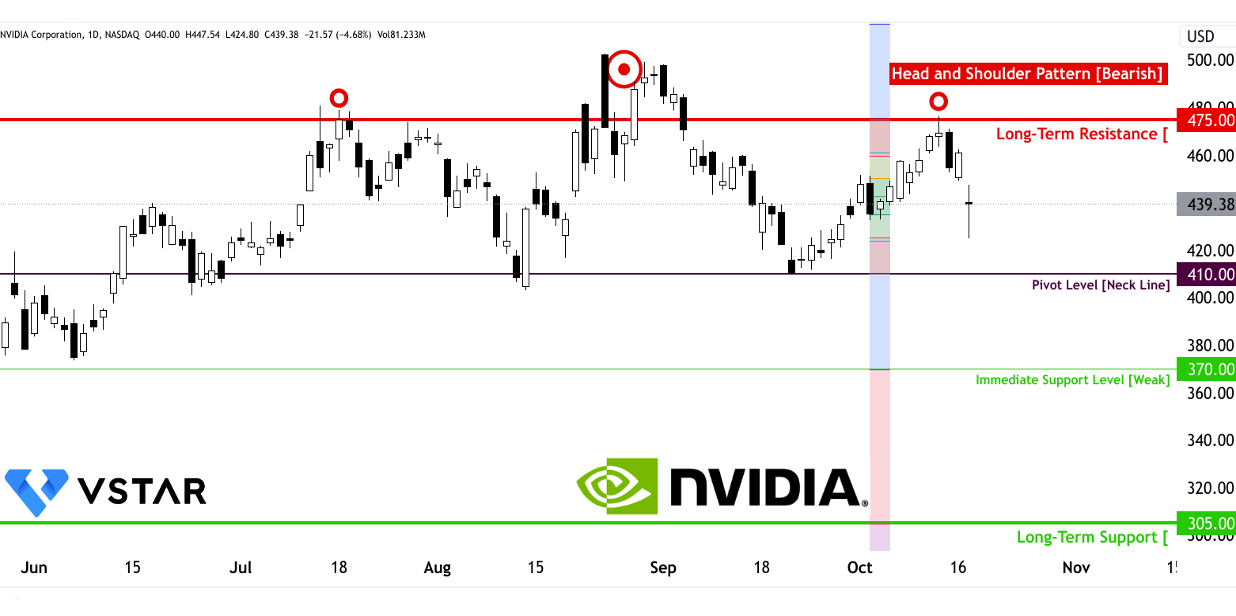Nvidia Corporation (NVDA), a leading player in the AI chip industry, may continue to experience a decline in its stock price following the U.S. government's announcement of new export restrictions on artificial intelligence (AI) chips to China. These restrictions, designed to control access to computing power, have raised concerns and questions about the implications for Nvidia's market valuations and its long-term growth prospects.
Immediate Stock Price Decline
Nvidia's stock price saw a noticeable decline in reaction to the news of the new export restrictions. This immediate market response reflects investor concerns about the potential ramifications of these restrictions on the company's financial performance. Stock prices often react swiftly to short-term news and policy changes, and this decline indicates that investors are apprehensive about how these restrictions might impact Nvidia's bottom line.
However, it's important to note that short-term stock price movements are often driven by sentiment and can be highly volatile. While the initial decline in stock price is significant, it doesn't necessarily provide a complete picture of the long-term implications for the company's market valuations.
Impact on Revenue and Sales
Nvidia's response to the restrictions is critical. The company stated that it doesn't anticipate an immediate material financial hit but does expect a long-term dip in sales. This indicates that Nvidia recognizes the potential challenges it may face in maintaining its sales performance in light of the new restrictions.
To assess the market valuations, it's essential to delve deeper into the impact on the company's revenue. While the immediate consequences may be limited, it's the long-term implications that could have a substantial effect on the company's financial health and, by extension, its market valuations. Nvidia generates a significant portion of its revenue from the Chinese market, and restrictions on exporting AI chips to China could disrupt its revenue stream and growth potential.
Dependency on AI Market
Nvidia's reliance on the AI market for growth is a central consideration. In recent years, the company's success has been closely tied to the surging demand for AI products and services, which are powered by Nvidia's AI chips. These chips have played a pivotal role in AI research, data centers, and industries like autonomous vehicles and gaming.
Any constraints on exporting AI chips, particularly to a market as significant as China, can directly impact Nvidia's growth trajectory. The AI market has been one of the primary drivers of Nvidia's revenue, and limitations on access to this market could significantly hinder the company's expansion.
Product-Specific Impact
The ban on exporting the H800 and A800 versions of Nvidia chips is product-specific. These specific chips could have been significant contributors to the company's overall portfolio. To gauge the impact on Nvidia's market valuations, it's essential to assess how much revenue and growth these products were driving.
If these particular chips were driving substantial sales and growth for Nvidia, the restrictions on their export to China could have a more pronounced impact on the company's market valuations. The significance of these products within Nvidia's product lineup is a crucial factor in evaluating the fallout of these export restrictions.
Government Policy Risks
The fact that the U.S. government is tightening export restrictions on AI chips to China due to concerns about national security and potential military use highlights a significant risk factor for Nvidia. Government policies and regulations can change, and companies operating in sensitive sectors like AI chips are inherently exposed to regulatory risks. The uncertainty stemming from evolving government policies can significantly affect investor confidence in the long term.
Companies in industries where technology and national security intersect need to adapt to changing government regulations and geopolitical dynamics. For Nvidia, understanding and mitigating the risks associated with government policy changes will be crucial to sustaining market valuations.
Long-Term Growth Prospects
Nvidia's expressed concerns about long-term sales signify a potential shift in its growth trajectory. While the immediate financial impact may not be substantial, the company is preparing for a sustained dip in sales. It is vital to evaluate Nvidia's ability to adapt and identify alternative revenue streams or markets to compensate for any losses in the Chinese market.
Sustainable growth is a fundamental driver of market valuations. Investors value companies that can demonstrate a clear path to growth, and Nvidia's ability to navigate these challenges and find new opportunities will play a critical role in determining its market valuations in the long term.
Competitive Landscape
The AI chip market is highly competitive, with companies like AMD, Intel, and emerging players vying for market share. The restrictions on Nvidia's exports to China might provide competitors with opportunities to gain ground. This competitive landscape is a key factor in assessing Nvidia's market valuations.
Nvidia's ability to defend its market position, even in the face of export restrictions, will be closely watched by investors. If competitors can seize market share, it may impact Nvidia's revenue, profitability, and ultimately its market valuations.
Global Implications
While the new restrictions primarily affect Nvidia's sales to China, they could have broader implications for the company's global operations. Companies worldwide may rethink their reliance on Nvidia's products due to concerns about future supply chain disruptions or export restrictions.
This global dimension adds another layer of complexity to the assessment of Nvidia's market valuations. It underscores the interconnectedness of the global tech industry and the potential ripple effects of geopolitical decisions on the company's prospects and valuations.
Investor Confidence
The decline in Nvidia's stock price reflects a loss of investor confidence. It's essential to monitor how long this sentiment persists and whether the company can regain investor trust through strategic actions and transparent communication. Investor sentiment can significantly impact market valuations, and the company's response to the export restrictions will play a crucial role in rebuilding that confidence.
In conclusion, the U.S. export restrictions on AI chips to China have introduced a range of challenges for Nvidia, impacting its market valuations and long-term growth prospects. While the immediate financial hit might be limited, the uncertainty and potential erosion of long-term growth prospects are of concern to investors. The company's ability to adapt, find new opportunities, navigate regulatory risks, and defend its market position will be pivotal in determining its market valuations in the coming years.
The technical perspective on the weekly price moves of NVDA stock can be comprehended as follows:

Source: tradingview.com




